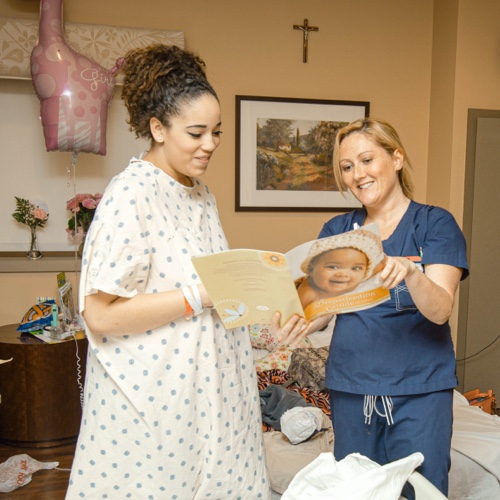Why Step 2?
Patients report that health care professionals like you are their preferred source of information and guidance on breastfeeding. However, education and training in breastfeeding are not a core element of medical and nursing schools.
Because few opportunities exist for health professionals to obtain competency in breastfeeding prior to starting patient care, comprehensive breastfeeding training in the healthcare facility is critical for all staff. Not only do breastfeeding education programs improve your personal knowledge and competency, they also enhance overall patient care. Studies indicate that training improves nighttime breastfeeding and decreases formula supplementation at night when lactation professionals are less available.1

Primary Goals of Step 2
- Train staff to provide safe, effective, evidence-based and patient-centered care to support breastfeeding and informed infant-feeding decisions.
- Empower women to make informed infant-feeding decisions by imparting to them an understanding of the benefits and management of breastfeeding.
- Support women to manage and carry out their chosen infant-feeding method(s) in an atmosphere of respect.
Ten Step Self-Assessment
Use the Ten Step Self-Assessment to help you evaluate your progress for this step. This self- assessment document does not have to be submitted with application.

New Applicants
- Use document checklist (PDF) to ensure appropriate support documentation is included with application.
- If your current practice does not meet these criteria, review the Ten Step Self-Assessment to assess how your facility might fully implement this step.

Re-Designation Applicants
- Review your individual Ten Step Scorecard from the last designation for change recommendations.
- Use the Ten Step Self-Assessment Tool to help plan for step-by-step improvement in any areas needed.
- Review the Baby Friendly USA, Inc. Guidelines and Evaluation Criteria to view full standard for this step.
Resources
-
Texas Health Steps
Free continuing education modules on maternal and infant health and breastfeeding.
-
The American Academy of Pediatrics (AAP) Breastfeeding Residency curriculum
Information designed to help residency program directors and faculty incorporate breastfeeding education into existing curriculum through implementation and evaluation strategies, useful tools and other trusted resources.
-
Maryland Hospital Policy Committee
Six recorded lectures that contain important strategies and practices related to promoting and supporting breastfeeding. Content designed to help physicians and advanced care providers meet BFHI step 2 training requirements.
-
The Breastfeeding University
Developed through the Carolina Global Breastfeeding Institute (CGBI) by an interdisciplinary team of physicians, nurses, lactation consultants, public health professionals, educators and La Leche League leaders, these trainings help learners to establish a working knowledge of the importance of breastfeeding and how to support mothers and families to meet their breastfeeding goals.
References
- Gavine, A., MacGillivray, S., Renfrew, M.J. et al. Education and training of healthcare staff in the knowledge, attitudes and skills needed to work effectively with breastfeeding women: a systematic review. Int Breastfeed J (2016) 12: 6.
- Olukunmi O. Balogun et al. Health Facility Staff Training for Improving Breastfeeding Outcome: A Systematic Review for Step 2 of the Baby-Friendly Hospital Initiative. BREASTFEEDING MEDICINE. Volume 12, Number 9, 2017.DOI: 10.1089/bfm.2017.0040
- Chuan-Ming Li et al. Associations of Hospital Staff Training and Policies with Early Breastfeeding Practices. Journal of Human Lactation. 2014, Vol 30(1) 88–96. DOI: 10.1177/0890334413484551


